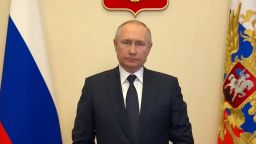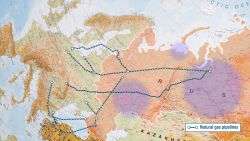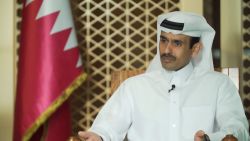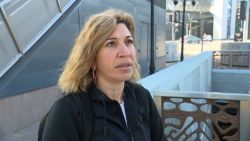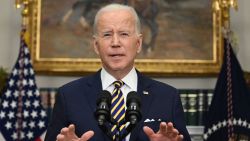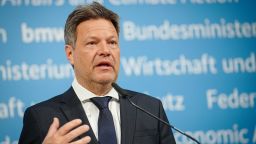Editor’s Note: Douglas London is the author of “The Recruiter: Spying and the Lost Art of American Intelligence.” He teaches intelligence studies at Georgetown University’s School of Foreign Service and is a nonresident scholar at the Middle East Institute. London served in the CIA’s Clandestine Service for over 34 years, mostly in the Middle East, South and Central Asia and Africa, including three assignments as a Chief of Station. Follow him on Twitter @DouglasLondon5. The opinions expressed in this commentary are his own. View more opinion at CNN.
CNN —
President Joe Biden’s apparently unplanned remarks suggesting that Russian President Vladimir Putin should not be in power complicate the pursuit of a goal that US and allied leaders likely favor, but which had been better left unspoken.
In an unscripted part of his speech Saturday in Warsaw, Biden said, “For God’s sake, this man cannot remain in power!” Biden and his aides quickly walked back his comments, denying that the President was actually calling for regime change in Russia.
Instead, the President said he was simply expressing moral outrage at the death and destruction caused by Putin. US officials no doubt recognized the harm that could come from Biden’s ad lib.
In the multi-level chess game of internal Russian power dynamics, the last thing those within the Kremlin who might consider moving against Putin need – whether to alter his direction on the war or remove him outright – is public encouragement from an American president. If the US’ strategic goal is influencing Russian behavior, rather than regime change, then President Biden’s remarks were not helpful.
For over 34 years as a member of the CIA’s Clandestine Service, I worked to persuade those serving under the often-brutal dictatorships of America’s international adversaries to spy for the US. Those who agreed might have welcomed the material benefits that came with cooperating with US intelligence, but most accepted compensation only reluctantly.
In fact, most such spies agreed to cooperate based on ideological dissidence with their illegitimate governments. Few took the enormous risks to themselves and their families out of kinship with the United States.
Rather, in their minds, they acted in the interests of their own country, not from serving the agenda of what many considered an imperialist foreign power.
American policymakers have historically failed to understand that people’s contempt for their autocratic rulers does not necessarily translate into an embrace of the US or its political values. They assume wrongly that whatever regime might rise from the ashes of a fallen despot or anti-American rival will share our global agenda or exalt democracy.
Across the masses in Russia and among populations similarly under the yoke of dictatorships in China and Iran, appreciative as some might be of the freedoms they believe Americans enjoy, few see the US government as a noble force for good. That does not mean, however, their common interests when aligned with ours won’t offer mutually advantageous political opportunities.
Russians in positions of power today do not necessarily subscribe to Jeffersonian democratic ideals or see America as the world’s shining beacon of light. They are focused on the attainment and preservation of power and privilege.
By nature, those who profited under Putin have been opportunists, not purely ideologues. The most successful keep their cards close to their vests, trust few, are careful not to make enemies and operate within carefully monitored coalitions. To succeed, they forge, and when necessary, forsake, alliances based on mutual interests.
Consider those who Putin advanced over the years. They did not achieve his patronage for their morals, ethics or even merit. Rather, Putin empowered and enriched those who loyally and ruthlessly did his bidding. This network extended his control and profit across all critical aspects of Russian society, government and industry.
The Russian leader surrounded himself with those who, superficially at least, embraced and parroted his vision. And the few who broke with him were isolated and punished. Putin wanted to send a message among the privileged who might consider stepping out of line – occasionally, a lethal one. The European Court of Human Rights ruled last year that Putin’s once faithful FSB lieutenant, Alexander Litvinenko, was poisoned by two Russian intelligence agents acting on the Kremlin’s behalf, a conclusion Moscow denied.
There has been much talk of the siloviki, “strongmen,” in the vernacular, the term for Russia’s most powerful government officials and oligarchs once members of the military or intelligence services. Many of the most prominent linked their fortunes to Putin as he rose in power. It is this elite community, rather than the Russian masses, who today have the power to challenge or depose Putin – and would do so most effectively as a collective, at least at the outset.
These siloviki are not friends of the US, closet pluralists or defenders of human rights. But neither do they necessarily place dogma before self-interests. The cleverest abandoned government positions as the Soviet Union collapsed. They profited from the empire’s dismemberment and rode Putin’s coattails joining his institutional kleptocracy.
The new elite shared its patron’s view of the US and the West as Russia’s principal adversary and competitor for the most practical of reasons: their own opportunity to secure power and privilege.
This is the target audience of the pressure the US and its allies are applying. And the goal should be aligning their interests with those of the West to facilitate Putin’s departure from his Ukrainian campaign, whether by influence or through his removal.
Russian officials who favor ending the war in Ukraine can say they are acting out of concern for Russia over the consequences of Putin’s folly. In contrast, any Russians who advocate Putin’s removal can be painted as being in league with, or puppets of, the US and NATO.
Any suggestion of regime change by the West empowers Putin to use it as a rallying call for unity and resistance. It plays to Putin’s theatrical use of victimization, casting himself as the heroic defender saving the nation from the whims of hostile foreign powers out to destroy Russia.
A rather more enlightened strategy, however, is working within the conspiratorial nature of internal Russian power dynamics. Russian politics is the business of conspiracy and consensus.
In its history as the Soviet Union, even the ostensibly all-powerful and unchallenged leaders maintained a Politburo which provided counsel and executed policy. When leaders were challenged, however, it was behind closed doors and achieved through consensus. Individuals acting alone had less luck.
At the time of Josef Stalin’s death in 1953, the next most powerful Soviet official was Lavrenty Beria, head of the secret police, the People’s Commissariat for Internal Affairs, better known as the NKVD, and what would become the KGB.
During the ensuing power struggle, Beria used his formidable tools to seize control, but was defeated by a Politburo coalition that resulted in his death and the succession of consensus candidate Nikita Khrushchev.
But Khrushchev would likewise fall in a 1964 palace coup owing in part to the Kremlin’s humiliation over the Cuban missile crisis. Khrushchev was deposed by his most trusted lieutenant, Leonid Brezhnev, who acted with the Politburo’s support.
And in August 1991, it was the “gang of eight,” a coalition that included the Soviet Union’s then-KGB Chairman, Defense Minister, Interior Minister and Premier, which moved, albeit unsuccessfully, to seize power from Soviet leader Mikhail Gorbachev. If Putin is to be swayed, or indeed removed in the near term, it will likely come at the hands of those closest to him, operating together.
The most powerful Russian figure today after Putin is arguably the man who succeeded him at the FSB, Nicolai Patrushev, secretary of Russia’s national security council, a post loosely on par with US National Security Advisor Jake Sullivan, but more powerful. Patrushev appears to have the strongest relationship with Putin of all in his court.
His remarks over the years embrace and amplify Putin’s illusions of Russian power, confrontation with the West and the brutal suppression of dissent. But Patrushev’s shared sentiments and participation in Putin’s re-Sovietization of Russia does not assure his willingness to go down with the captain and his ship.
Opportunism and self-preservation could yet induce those close to Putin across the intelligence, security agencies and military components to press him to alter his position, or by their own accord, remove him should he not. But the last thing the siloviki wish to appear, or would ever be, are US allies. What they can be, however, are actors in a more carefully scripted and soundly executed US and allied strategy.


